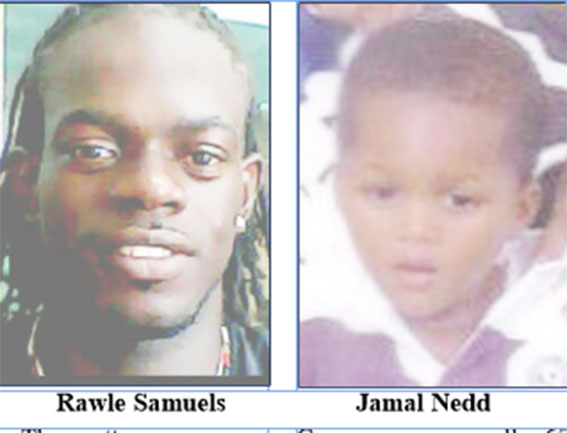The Guyana Court of Appeal yesterday affirmed the life sentence given to child killer Rawle Samuels but struck out the stipulation by the trial judge that he must serve thirty calendar years before he can be considered for parole.
Justice of Appeal Arif Bulkan, who delivered the judgment of the court on the appeal which was also heard by acting Chancellor Yonette Cummings-Edwards and Justice of Appeal Rafiq Khan, said they found that the trial judge erred when he made the parole stipulation.
On July 18th of last year, Samuels, who had been indicted for murder, pleaded guilty to the lesser offence of manslaughter to the gruesome February 6th, 2013 slaying of four-year-old Jamal Nedd. He was sentenced to life in prison with the stipulation that parole should only be considered after 30 calendar years.
He later appealed the sentence imposed by trial judge Justice Nareshwar Harnanan and his lawyer Stanley Moore had argued that it was “manifestly excessive.”
In delivering the ruling Justice Bulkan noted that the injuries inflicted on Jamal were particularly gruesome as he had five wounds, two were gaping and a knife was lodged in the right side of his back. He noted that the convict did throw himself at the mercy of the court at the first chance given but after the sentence he appealed on the grounds that he was unrepresented at the time and that the trial judge erred in the “wrong and excessive” sentence.
The judge said that they reviewed all the facts of the matter as well as the reasons given by the trial judge which were very carefully articulated. How-ever, he pointed out that the trial judge did not articulate how he arrived at the base figure of the sentence.
He said that it was the view of the three presiding judges that the trial judge erred when he arrived at the 30 calendar years and that there should have been no such stipulation. How-ever, he noted the viciousness of the offence and the fact that the victim offered no resistance and as such the ruling was that they would allow the appeal in so much as it relates to the 30 calendar years but the sentence of life in prison stands.
As the three judges stood to make their exit, Samuels stuck his finger in the air, an indication he wanted to speak, but it was ignored by the judges. As he was about to be led out of the court he hugged three females who all shed tears.
The matter was prosecuted by Natasha Backer who had argued that the trial judge’s sentence was fair. However, Moore had argued that 20 years was a more “suitable sentence” for his client to serve. He had advanced that the life expectancy for male Guyanese is generally 65 years and argued that after making the deductions, which Justice Harnanan would have made when he handed down the sentence, 20 years would have been appropriate.
It was the state’s case that on the day of the incident Samuels, armed with a knife, was pursuing Jamal’s aunt, after an altercation he had with her.
As the woman was fleeing, the toddler, who had just arrived home from school and saw what was transpiring, repeatedly encouraged her to, “run, aunty.”
It was at this point that the man turned his weapon on Jamal, who was stabbed multiple times about his body.
The convict had by this time picked up the young boy and thrown him back into his aunt’s yard, where he repeatedly plunged a knife, with a blade 17 cm long and with a width of 4 cm, into his body, including into his back, where he left it stuck.
The court had been told that by the time the child was rushed to the Mackenzie Hospital Complex, he was gasping for breath.
In a report, the probation officer said Samuels accepted total responsibility for his actions and expressed remorse, while stating that he did not know what he was doing at the time.
In his address to the court prior to being sentenced, Samuels had said that he was sorry for his actions.
The trial judge had started at a base of 45 years to be spent behind bars before Samuels would be eligible for parole but deducted four years for the time he had been awaiting trial, six years for his guilty plea, and five years for good prison behaviour revealed by the probation report. This brought the total to 30 years to be served before consideration for parole.









